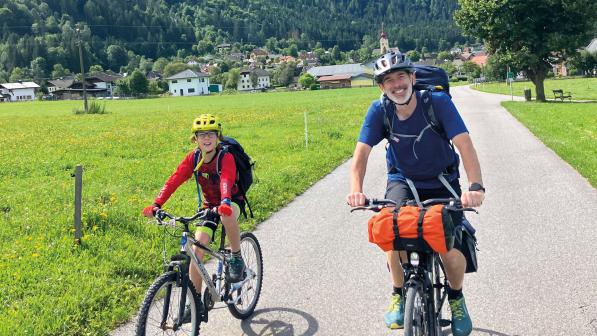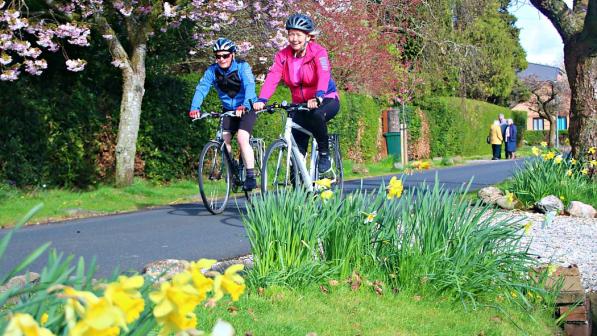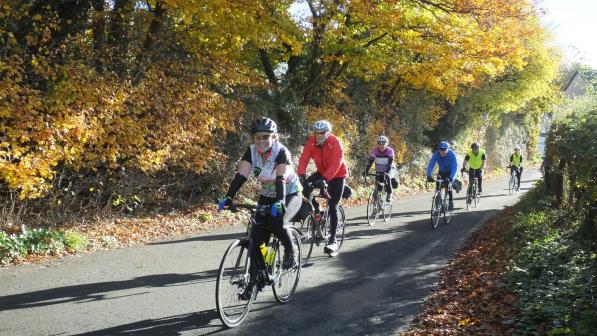Lead the way: the role of the ride leader
You’re sitting in a really nice café, one that welcomes cyclists, and chatting with your fellow riders while you sip a well-deserved coffee. You might be discussing the route, the scenery or the latest hack for keeping your bike on the road.
But there’s more than likely someone there a bit less animated than the rest, someone who’s only half listening because they’re also thinking about the route home, the amount of daylight left, those looming clouds on the horizon and the possible bailout options if what was forecast as light drizzle turns into a torrential downpour – as well as whether or not that new rider is having a good time.
That person is somebody many of us who take part in group rides take for granted: the ride leader. Without them there’d quite possibly be no quiet, interesting route to follow, no cycle-friendly coffee stop and nobody else to share the joys of a great ride with.
Nowadays it’s possible to download routes from an app and go out on your own without getting lost. Yet it’s so much more motivating if somebody else has taken the time to plan a ride, so that all you have to do is turn up at the meeting point at the allotted time with a functional bike and kit.
Although you alone are responsible for making sure you’re prepared for a group ride, many leaders will have a wealth of experience in keeping groups together to make sure everyone enjoys themselves and gets home safely.
Some may also be able to help with things like minor mechanicals or spare clothing. At the very least, you will have someone to ride with who wants you to enjoy cycling in the local area as much as they do.
Leading lights
Group rides have always been a central part of Cycling UK’s history, offering members the opportunity to cycle in like-minded company while benefiting from the moral and technical support offered by fellow riders.
We don’t require our member or affiliate group ride leaders to have formal qualifications, although we strongly recommend they take both ride leader and first aid training courses (see ‘Ride leader resources’ in the sidebar).
Ride leaders come from all disciplines and walks of life. They may or may not have great mechanical skills. They may prefer a slow pootle to a head-down blast. Good ones will all be able to put together a pleasant route and tailor the ride to suit the ability and interests of the majority of their riders so that everyone comes back wanting more.
Other useful attributes are humour, patience, kindness, confidence and empathy.

Different leaders can bring different things to their rides. Off-road ride leader Gus Cairns, who volunteers at Cycling UK’s Dunoon Bothy project in Argyll and Bute, makes a point to find out about the local flora and fauna or historical points of interest.
He says this “helps with keeping people engaged and is also a way of allowing everyone to have a breather, particularly after a tough climb.” His rides encourage folk to come out in most weathers, with some attending from as far away as Glasgow to explore the stunning terrain and views of the Firth of Clyde.
Reaping the rewards
So what’s in it for the ride leaders? Why would anyone go to the effort of voluntarily organising bike rides for others and take on the responsibility that this involves? Gus likes the excuse to be outdoors. He usually leads one ride a week, depending on his work commitments.
CeCe Balfour has recently become a ride leader for Cycling UK-affiliated New Forest Off-Road Club, which was founded in 2020 with “ambitions to set the blueprint for the most inclusive, accessible and diverse, community-led group rides”.
CeCe, who rides an ICE Adventure recumbent trike with Enviolo automatic gears and pedal assist, says: “I like seeing people enjoying riding their bikes. I also love meeting new people and catching up with friends. Sometimes I feel nervous when I meet new people, but when I am riding, meeting new people is easier. It’s just amazing!”
There are other perks, such as being able to decide where you ride, for how long and at a pace that suits you. You call the shots. Not happy with your group’s current offerings? Why not organise your own rides and see if others feel the same?
However, providing pleasure to the participants is mainly what makes the role so rewarding, along with the sense of giving something back to the community.
Gus’s rides, which take in the many miles of fire roads in the Dunoon area and attract people from all walks of life and of all ability levels, focus on improving the riders’ mental and physical wellbeing.
A recent rider said: “Thank you for allowing me to participate in your led ride today. Although I found the ride challenging, I did enjoy it. I thought that you were very encouraging and I therefore felt safe.”
Another participant added: “I’ve been on several rides with Gus Cairns. He’s brimming full of energy and enthusiasm for off-road cycling, really knows his stuff, sets a standard for fun riding, is equally mindful of keeping us safe, as well as encouraging folks with less experience. And he really does know the routes around Dunoon.
“On top of that, he has a good grasp of bike mechanics – he saved my bacon on a wintery day, helping out when my fingers couldn’t cope with changing a punctured tube. And he can give advice on bike setup as well as riding skills.”
Wheels of change
It’s not just the physical benefits of being out in the fresh air and enjoying the scenery that make led rides so valuable. Steve Potter runs New Routes Bike project, which has received support from Cycling UK’s Vanessa Morris. It is located in Ladywood and Winson Green, a very deprived and diverse area of Birmingham.
New Routes is an off shoot of the Newbigin Community Trust, an organisation that aims to provide a place of “welcome, inclusion and social cohesion for neighbours in the area.”

Steve and fellow ride leaders Jack, Andy and Alex from New Routes organise a led ride for beginners along the extensive canal network in the city every Thursday, with a coffee stop often included.
The aim is to give people who struggle with issues such as drug and alcohol addiction not only the confidence to cycle but also the chance to be part of a group and benefit from the camaraderie and sense of belonging this brings.
Steve says: “Many of them have only ever done their own thing, so it can be challenging to keep their focus on the needs of the group, rather than their own immediate priorities. For example, they might suddenly decide they want to stop for a cigarette break. The way to deal with this is to be firm so that the group stays together.”
The project also provides participants with refurbished bikes and has been very successful at getting people from the surrounding area out in the open air, enjoying the chance for some companionship and learning a new skill.
One recent ride attracted 13 people. The goal is to encourage the riders to go further along the 250-mile canal network and eventually take in some sections of road, with a view to using the bikes they have been donated as day-to-day transport.
Teamwork makes the dream work
Lowri Evans is a long-standing ride leader and secretary of Chester & North Wales CTC member group (also known as CTC Caer a Gogledd Cymru). Her way of keeping the group together is to focus on teamwork.
She says: “Everyone on the ride should be coming along ready to have fun – even though this might be type two fun – and with the expectation that they have a part to play in ensuring that all have a safe and enjoyable ride, with great company, an interesting route, friendly cafés and good weather as a bonus.”
Many people might not feel confident enough in their navigation skills to offer their services as a ride leader. Lowri uses various methods to plan her rides.
She says: “If it is an unfamiliar route, I tend to look at an Ordnance Survey map and may try to plan it on Ride With GPS. For a very local route, it is usually local knowledge, with variations according to weather, time and mechanicals.”
Sometimes rides are planned around a particular theme, such as to take in routes with lots of daffodils on St David’s Day. Her most recent ride was only five miles, almost all on cycle paths: “We ended up doing some ‘forest bathing’, which was a new term to me.”
Lowri doesn’t claim that things never go awry and, despite 25 years of ride leading, says she is always learning. “There is always scope to learn and improve. I have done both the one-day Cycling UK Club Leader training course and the much newer online course for members. It’s helpful to try to keep up to date and get new ideas.”

She’ll also always listen to others if their local knowledge is better at, for example, predicting when it’s going to rain, and she recommends appointing “a really good back marker to assist, or even leading from the back yourself, so you can keep an eye on riders who may need some extra support.”
Tips and tactics
Lowri’s other top tips for making sure nobody gets lost or discouraged include “encouraging riders to look back to see if everyone is there. There are times on rides when it can help to let faster riders go ahead, with an arranged point for regrouping.
“Stronger riders can also shelter others if riding into a strong headwind. On most rides there isn’t a GPX route sent out in advance, so people are more likely to wait at the top of a hill or junction to check where to go.”
Gus’s Dunoon Bothy rides are free and open to anyone, whatever their skill level. Some take part on traditional bikes and some are on e-bikes, so Gus always asks the group to cycle at the pace of the slowest.
He finds loops on fire roads are easiest for everyone as the gravel surface is perfectly rideable and, as someone with a Level 2 Mountain Bike Leadership certificate, he is only qualified to lead on trails of a non-technical nature within a half-hour walk of a road.
On CeCe’s rides, “miles are not as important as smiles”, she says. For her, the ideal group ride would have “lots of familiar friends, along with new people. I’d make sure new people were happy and felt welcomed to the group and there would be lots of chat and laughter. Everyone will support each other and there will be cake!”
Cycling UK’s own recommendations include:
- Finding out the names of everyone on your ride – not just for insurance purposes but because it’s friendlier
- Giving a short briefing at the start to include likely distance, terrain, planned stops and time of return. This will give everyone an idea of what to expect and prevent grumbles later on
- Explaining how you will lead the ride and any jargon and hand signals you might use; when and where you will wait for stragglers; how you will deal with traffic and so on. But also reminding each rider they are responsible for their own safety
- Pointing out any likely hazards in advance
- Avoiding blocking roads and trails by choosing stopping points carefully
- Keeping the ride flowing smoothly but stopping occasionally and giving stragglers a rest before restarting
- You have a duty of care to the riders and the public, so if you think someone may endanger themselves or others, have a quiet word with them. If their behaviour persists, you are entitled to ask them to leave the ride
- You should lead by example and remain courteous and considerate to all road or trail users and fellow riders
- Ensuring anyone who wishes to leave the ride is happy to make their own way home
- At the end of the ride, thanking people for coming and letting them know details of the next one, if you have them

Taking the lead
Khalda Begum from Share Calthorpe community cycle club in Birmingham recommends volunteering as a ride leader to everyone. She explains: “It’s a way of giving back to the community, as well as a way of making new relationships and building confidence on a bike.
“You have the perfect excuse to get exercise out in the fresh air and challenge yourself – sometimes being a ride leader means learning to be patient! But you’ll also surprise yourself with how much you can achieve. It’s very worthwhile.”
If you would like to give ride leading a go, speak to your group’s secretary or rides coordinator. The group may provide an induction and even a mentor.
Cycling UK strongly recommends that our member and affiliate group ride leaders undertake training in ride leading and first aid but doesn’t insist on them. Other organisations may do so, however, especially if a payment for the ride is involved.
For member groups, we ask that ride leaders are proposed and seconded by at least two committee members who can vouch for their suitability to have duty of care for others as well as plan and lead safe and congenial rides.
All member group ride leaders should be registered with us for insurance purposes. Affiliate groups are strongly encouraged to submit names to us as well.
If you are delivering skills training as part of the role, either on or off road, you will likely need a professional qualification such as National Standard instructor training or Technical Mountain Bike Leader. You may also need to undertake a first aid and/or bike mechanic course.
In this case, you should also think about Cycling UK’s Cycle Activity Provider insurance policy (see ‘You’re covered’ in the sidebar). This provides indemnity for individuals rather than groups.



